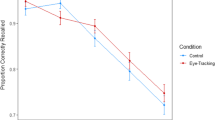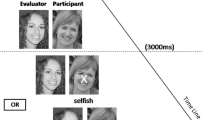Abstract
Social media users may regulate their behaviors to follow norms of their online communities. This regulation process, however, might be too transient to be captured using self-reports and therefore is suitable for a NeuroIS investigation. Previously, in an event-related potential (ERP) experiment designed to study this regulation process, Huang, Kuo, and Lin [1] found that this regulation process could be reflected in an ERN-like ERP, and the ERP’s magnitude is correlated with people’s internet privacy concern. In this work-in-progress we seek to use eye-tracking to replicate their findings. Here we report our current results of pupil size anslyses, which so far are consistent with the previous ERP findings.
Access this chapter
Tax calculation will be finalised at checkout
Purchases are for personal use only
Similar content being viewed by others
References
Huang, Y.-f., Kuo, F.-Y.B., Lin, C.S.: Behavior regulation in social media: a neuroscientific investigation. In: ICIS 2017 Proceedings. Seoul, South Korea (2017)
Hofmann, W., Schmeichel, B.J., Baddeley, A.D.: Executive functions and self-regulation. Trends Cogn. Sci. 16(3), 174–180 (2012)
Polites, G.L., Karahanna, E.: The embeddedness of information systems habits in organizational and individual level routines: Development and disruption. MIS Q. 37(1), 221–246 (2013)
Carver, C.S., Scheier, M.F.: Attention and Self-Regulation. Cambridge University Press, New York (1981)
Baumeister, R.F., Heatherton, T.F., Tice, D.M.: Losing Control: How and Why People Fail at Self-Regulation. Academic, San Diego (1994)
Ward, A., Mann, T.: Don’t mind if i do: disinhibited eating under cognitive load. J. Pers. Soc. Psychol. 78(4), 753–763 (2000)
Willard, N.E.: Cyberbullying and cyberthreats: responding to the challenge of online social aggression, threats, and distress. Research Press, Champaign Illinois (2007)
Dinev, T., Hart, P.: Internet privacy concerns and their antecedents-measurement validity and a regression model. Behav. Inf. Tech. 23(6), 413–422 (2004)
Shojaeizadeh, M., et al.: Detecting task demand via an eye tracking machine learning system. Decis. Support Syst. 116, 91–101 (2019)
Kahneman, D., Beatty, J.: Pupil diameter and load on memory. Science 154(3756), 1583–1585 (1966)
Fehrenbacher, D.D., Djamasbi, S.: Information systems and task demand: an exploratory pupillometry study of computerized decision making. Decis. Support Syst. 97, 1–11 (2017)
Conrad, C., Bailey, L.: What can neurois learn from the replication crisis in psychological science? In: Davis, F.D. (ed.) Information Systems and Neuroscience, pp. 129–135. Springer, Switzerland (2019)
Einhäuser, W., et al.: Pupil dilation reflects perceptual selection and predicts subsequent stability in perceptual rivalry. Proc. Natl. Acad. Sci. 105(5), 1704–1709 (2008)
Luu, P., Tucker, D.M., Makeig, S.: Frontal midline theta and the error-related negativity: neurophysiological mechanisms of action regulation. Clin. Neurophysiol. 115(8), 1821–1835 (2004)
Hess, E.H., Polt, J.M.: Pupil size in relation to mental activity during simple problem-solving. Science 143(3611), 1190–1192 (1964)
Hess, E.H., Polt, J.M.: Pupil size as related to interest value of visual stimuli. Science 132(3423), 349–350 (1960)
Kiesler, S., Siegel, J., McGuire, T.W.: Social psychological aspects of computer-mediated communication. Am. Psychol. 39(10), 1123–1134 (1984)
Spears, R., Lea, M.: Social influence and the influence of the 'social' in computer-mediated communication. In: Lea, M. (ed.). Harvester Wheatsheaf (1992)
Author information
Authors and Affiliations
Corresponding author
Editor information
Editors and Affiliations
Rights and permissions
Copyright information
© 2020 The Editor(s) (if applicable) and The Author(s), under exclusive license to Springer Nature Switzerland AG
About this paper
Cite this paper
Huang, Yf., Kuo, Fy. (2020). Behavior Regulation in Social Media: A Preliminary Analysis of Pupil Size Change. In: Davis, F.D., Riedl, R., vom Brocke, J., Léger, PM., Randolph, A.B., Fischer, T. (eds) Information Systems and Neuroscience. NeuroIS 2020. Lecture Notes in Information Systems and Organisation, vol 43. Springer, Cham. https://doi.org/10.1007/978-3-030-60073-0_7
Download citation
DOI: https://doi.org/10.1007/978-3-030-60073-0_7
Published:
Publisher Name: Springer, Cham
Print ISBN: 978-3-030-60072-3
Online ISBN: 978-3-030-60073-0
eBook Packages: Computer ScienceComputer Science (R0)




